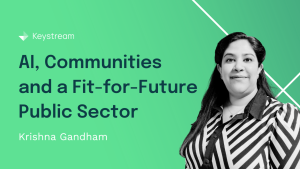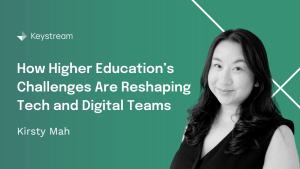17.07.2025
How Higher Education’s Challenges Are Reshaping Tech and Digital Teams
The UK higher education sector is at a crossroads.
Once known for stability and long-term thinking, universities are now navigating uncertainty on every front, from squeezed budgets and changing student demographics to rising expectations for digital-first services.
As someone who has spent the past six years recruiting into this space, I have seen how these pressures are reshaping how institutions hire, retain, and structure their digital, data, and tech functions.
Under Pressure: What’s Really Going On
Budgets Are Breaking
Rising costs, frozen tuition fees, and a drop in international student numbers have left many universities in the red. One third of UK institutions are now operating at a deficit.
IT and digital teams are often the first to feel the squeeze, with hiring freezes, paused transformation programmes, and critical roles left unfilled. Tech functions are still viewed as cost centres in many institutions, not strategic enablers.
The Demand for Digital Keeps Growing
Students and staff expect slick, digital-first experiences across the board, from enrolment to accessing learning platforms and services. Institutions are under pressure to modernise legacy systems, invest in cybersecurity, and make better use of their data.
But those expectations are landing on lean, overstretched teams, many still working with outdated structures and missing specialist capabilities.
Talent Is Getting Harder to Find (and Keep)
Hiring into digital, data, infrastructure, and cyber has never been more competitive. The private sector’s edge on salary, flexibility, and career progression continues to widen the gap.
Even when roles are signed off, slow hiring processes, rigid job specifications, and limited remote working options cause many strong candidates to drop out before offer stage.
The Fallout for Tech and Digital Teams
Overloaded and Under Resourced
Teams are being pulled in too many directions, expected to manage both BAU and transformation projects. Burnout, mistakes, and missed deadlines follow, especially in high skill areas like DevOps or systems migration.
Projects Stalling, Delivery Slowing
Transformation is slowing down because roles stay unfilled or niche expertise is not available. When universities do turn to contractors, they often struggle to find the right people quickly or at the right rate.
Leadership in the Firing Line
CIOs, Heads of Digital, and Programme Directors are under mounting pressure to deliver ambitious change with shrinking resources. The trade offs between short term delivery and long term capability are becoming harder to justify.
What Needs to Shift and How Recruitment Can Help
This is where recruitment has to become more strategic. It is not just about plugging gaps, it is about building a digital workforce that can flex with your institution’s needs.
Here is what is working for the clients I partner with:
- Blended hiring models
Using permanent, contract, and consultancy options to align with timelines and budgets - Smarter role design
Supporting hiring managers to reframe specifications based on real world needs and market realities - Faster processes
Streamlining hiring timelines to stay competitive and reduce candidate drop out - Sector specific knowledge
Understanding the funding cycles, governance, and internal politics that shape how hiring really works in higher education
My Role in All This
I work exclusively across the education and not for profit sectors, supporting clients as they build and scale their digital, IT, and data teams.
That might mean:
- Sourcing interim leadership to deliver a transformation programme
- Building out permanent teams in competitive areas
- Advising on salary benchmarking and market availability
- Providing up to date insight into the candidate landscape
Final Thought
The challenges in higher education are not going anywhere fast. But with the right capability and the right people, universities can still deliver meaningful transformation, improve services, and meet rising expectations.
If you are hiring, planning your team structure, or just want to sense check what is happening in the market, I would be happy to chat.
Written by Kirsty Mah


